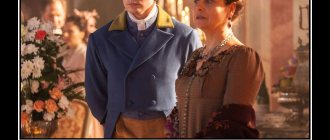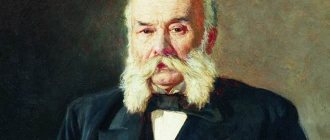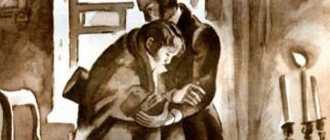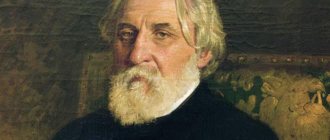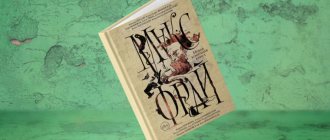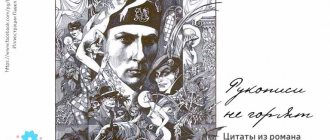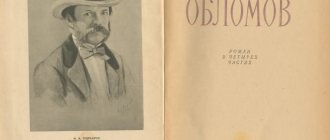Quotes from the novel “Anna Karenina”
The collection includes quotes from the novel “Anna Karenina” by Leo Tolstoy, written in 1873-1877.
I? Do you find it? I'm not weird, but I'm bad. Eh, it happens to me. I keep wanting to cry. It's very stupid, but it goes away. “I didn’t want to leave St. Petersburg, but now I don’t want to leave here.”
God gave the day, God gave strength. Both the day and energy are devoted to work, and in it itself is the reward.
I have never missed the village, the Russian village, with the bast shoes and the peasants, as much as I did when I spent the winter with my mother in Nice. Nice in itself is boring, you know. And Naples and Sorrento are good only for a short time. And it is there that Russia is especially vividly remembered, and it is the village.
All the diversity, all the charm, all the beauty of life is made up of shadow and light.
I was looking for an answer to my question. But thought could not give me an answer to my question; it was incommensurate with the question. Life itself gave me the answer, in my knowledge of what is good and what is bad. And I did not acquire this knowledge by anything, but it was given to me along with everyone else, given because I could not take it from anywhere.
Everything is confused, there are children running around alone.
I always think that men do not understand what is noble and ignoble, but they always talk about it.
It's all because of that stupid smile.
This is our Russian indifference - not to feel the obligations that our rights impose on us, and therefore deny these obligations.
Yes, Alabin gave dinner on glass tables, yes, and the tables sang: Il mio tesoro, and not Il mio tesoro, but something better, and some small decanters, and they were women.
I recognize zealous horses by some of their brands, I recognize young lovers by their eyes.
Yes, to become your mistress and destroy everything...
What he called his beliefs was not only ignorance, but that it was a mindset in which it was impossible to know what he needed.
The only salvation from people is to hide your wounds from them.
Not at all, why do you despise Matvey and me so much?
Your wife is getting old, but you are full of life. Before you know it, you already feel that you cannot love your wife with love, no matter how much you respect her. And then suddenly love turns up, and you’re gone, gone!
Pretense in anything can deceive the most intelligent, insightful person: but the most limited child, no matter how skillfully it is hidden, recognizes it and is disgusted.
There is a way out of every situation. We need to make up our minds.
Shame and disgrace! - answered the colonel. — The only thing you’re afraid of is meeting Russians abroad.
How often the happiness of marriages scatters like dust, precisely because that same passion appears that was not recognized.
She began to think with pleasure about how he would suffer, repent and love her memory when it was too late.
Levin made the remark long ago that when it becomes awkward with people because of their excessive compliance and submissiveness, it will very soon become unbearable because of their excessive demands and pickiness.
He realized that she was not only close to him, but that he now did not know where she ended and he began.
People who cannot do anything should make people, and the rest should contribute to their enlightenment and happiness.
Well, go, my little Tanchurochka.
On Varenka, she realized that all she had to do was forget herself and love others, and she would be calm, happy and beautiful. And this is what Kitty wanted to be...
You cannot forbid a person to make himself a large wax doll and kiss it. But if this man with a doll came and sat down in front of the lover and began to caress his doll, as a lover caresses the one he loves, then the lover would feel unpleasant
Man is given reason to get rid of what bothers him.
There are no conditions to which a person cannot get used, especially if he sees that everyone around him lives the same way.
Vronsky’s mother, having learned about his connection, was at first pleased - both because, in her opinion, nothing gave the final finishing touch to a brilliant young man like a connection in high society, and because Karenina, who she liked so much, talked so much about her son, she was still the same as all beautiful and decent women, according to the concepts of Countess Vronskaya.
Denying a fact is not the answer.
He could not look at her for a long time, like the sun, but he saw her like the sun, even without looking.
Love those who hate you, but you cannot love those you hate.
He knew that she was there by the joy and fear that gripped his heart. She stood talking to a lady at the opposite end of the skating rink. There seemed to be nothing special about her clothes or her posture; but for Levin it was as easy to recognize her in this crowd as a rose in a nettle. Everything was illuminated by her. She had a smile that lit up everything around.
In addition to intelligence, grace, beauty, there was truthfulness in her... What an amazing, sweet and pitiful woman.
Like generally impeccably moral women, tired of the monotony of moral life, she from afar not only excused criminal love, but even envied it.
There are less delights in life when you think about death, but it is calmer.
A woman who did not guess with her heart where the happiness and honor of her son lay, has no heart.
Lost battles usually start with lucky shots.
If good has a cause, it is no longer good; if it has a consequence - a reward, it is also not good. Therefore, good is outside the chain of cause and effect.
You can save a person who does not want to die; but if the whole nature is so corrupted and depraved that destruction itself seems to her salvation, then what to do?
For him, all the girls in the world are divided into two types: - one type is all the girls in the world except her, and these girls have all human weaknesses, and the girls are very ordinary; another type - she is alone, without any weaknesses and above everything human.
Respect was invented in order to hide the empty place where love should be.
Yes, brother, women are the screw on which everything turns.
A believer cannot be unhappy, because he is not alone.
“You remember that I forbade you to utter the word “love,” that disgusting word,” Anna said, shuddering; but immediately she felt that with this one word: forbidden, she showed that she recognized her right to him and thereby encouraged him to talk about love.
You can feel it in the air, you can feel it in your heart
All happy families are alike, each unhappy family is unhappy in its own way.
I think, I think... if there are so many heads, so many minds, then there are so many hearts, so many kinds of love.
Everything was mixed up in the Oblonskys’ house.
I can't think about you and myself separately. You and I are one for me
This whole world of ours is a small mold that has grown on a tiny planet. And we think that we can have something great - thoughts, deeds!
“I’ve tried everything,” he thought, “there’s only one thing left to do—not pay attention.”
...My life now, my whole life, regardless of everything that can happen to me, every minute of it is not only not meaningless as it was before, but has an undoubted meaning of good, which I have the power to put into it!
Topics of the issue: statements, sayings, aphorisms, phrases and quotes from the novel “Anna Karenina”...
LiveInternetLiveInternet
Lev Nikolaevich Tolstoy
On September 9, 1828, the famous Russian writer Lev Nikolaevich Tolstoy was born in the Tula province. His works are considered world-class classics, his talent has never been questioned, and his charisma still delights millions of people.
Today, on the occasion of the writer’s birthday, Buro 24/7 is analyzing for quotes one of the main novels of his work, “Anna Karenina,” based on the plot of which another film was recently shot. We invite you to recall some lines from Lev Nikolaevich’s novel, which, we hope, migrated unchanged into the script for the new film adaptation.
“All happy families are alike; every unhappy family is unhappy in its own way.”
“Respect was invented in order to hide the empty place where love should be.”
“For him, all the girls in the world are divided into two types: one type is all the girls in the world except her, and these girls have all human weaknesses, and the girls are very ordinary; another type - she is alone, without any weaknesses and above all human things.”
“There are no conditions to which a person cannot get used, especially if he sees that everyone around him lives the same way.”
“If good has a cause, it is no longer good, if it has a consequence - a reward, it is also not good. Therefore, good is outside the chain of cause and effect.”
“By getting to know your one wife, whom you love, you will get to know all women better than if you knew thousands of them.”
“No one is happy with his condition, and everyone is happy with his mind.”
“She does so much good! Ask anyone you want! - May be. But it’s better when they do it in such a way that, no matter who you ask, no one knows.”
“People who cannot do anything should make people, and the rest should contribute to their enlightenment and happiness.”
“You can save a person who does not want to die; but if the whole nature is so spoiled, depraved, that destruction itself seems to her salvation, then what to do?
“Lost battles usually start with lucky shots.”
“You won’t believe how useful this regime is against all sorts of nonsense. I want to enrich medicine with a new term: Arbeitscur (cure by work).”
“The only salvation from people is to hide your wounds from them.”
“But this is the purpose of education: to make pleasure out of everything.”
“It’s so easy to live in the world if you only follow the obvious truth that kindness, love, openness are the best, simplest and, moreover, accessible ways to bring people together.”
Yulia Dyachenko
"Vector of spirituality"
- 25.10.2016
- Valery Lukyanenko
What is Leo Tolstoy's novel Anna Karenina about?
The answer is simple - any novel is primarily about its author. The novel Anna Karenina is no exception. Moreover, Leo Tolstoy is directly involved in the plot under the name Konstantin Levin. What does Anna Karenina have to do with it? Her fate is an indicative background against which the main thoughts of Levin-Tolstoy are highlighted. Behind the fascinating plot, the reader often does not notice this. Therefore, below I will give a few quotes that I underlined during my last reading of the novel. “Not only could he not imagine loving a woman without marriage, but he first imagined a family, and then the woman who would give him a family. His concepts of marriage therefore were not similar to the concepts of most of his acquaintances, for whom marriage was one of many common affairs; for Levin this was the main matter of life, on which all her happiness depended" "She also knew that he was really interested in political, philosophical, theological books, that art was completely alien to him by nature, but that, despite this, or better As a result, Alexey Alexandrovich did not miss anything that was making noise in this area, and considered it his duty to read everything. She knew that in the field of politics, philosophy, theology, Alexey Alexandrovich doubted or was searching; but in matters of art and poetry, especially music, of which he was completely devoid of understanding, he had the most definite and firm opinions
. He loved to talk about Shakespeare, Raphael, Beethoven, about the importance of new schools of poetry and music, which were all distributed with a very clear sequence.”
“No, excuse me, but I consider myself and people like me an aristocrat, who in the past can point to three or four honest generations of families who were at the highest level of education (talent and intelligence are another matter), and who have never before they were not mean to anyone, they never needed anyone, the way my father and my grandfather lived.”
“This child, with his naive outlook on life, was a compass that showed them the degree of their deviation from what they knew but did not want to know
»
“It was revealed to her that, in addition to the instinctive life to which Kitty had hitherto devoted herself, there was a spiritual life. This life was revealed by religion, but a religion that had nothing in common with the one that Kitty knew from childhood, a religion expressed in mass and all-night vigil in the Widow's House, where one could meet acquaintances, and in learning Slavic texts by heart with the priest; it was a sublime, mysterious religion, associated with a number of beautiful thoughts and feelings, which one could not only believe in because it was commanded, but which one could love.”
“Stepan Arkadyevich, like all guilty husbands
, who was very concerned about his wife’s comfort, himself inspected the house and made orders about everything, in his opinion, necessary.”
“Pretense in anything can deceive the most intelligent, insightful person; but the most limited child, no matter how skillfully it is hidden, recognizes it and is disgusted
»
“He believed that human life was possible only abroad, where he went to live at the first opportunity, and at the same time he ran a very complex and improved economy in Russia and followed everything with extreme interest and knew everything that was happening in Russia. He considered the Russian peasant to be at the transitional stage of development from ape to man, and at the same time, during the zemstvo elections, he most willingly shook hands with the peasants and listened to their opinions” (approx. similar to Lenin
)
“The workers do not want to work well and use good tools. Our worker only knows one thing - to get drunk like a pig, drunk and ruin everything you give him. He will drug the horses, tear off a good harness, change a studded wheel, drink it, and throw a pin into the thresher to break it. He is sick of seeing everything that is not according to him. This is why the entire level of economy has gone downhill.”
“Levin made the remark long ago that when it becomes awkward with people because of their excessive compliance and submissiveness, it will very soon become unbearable because of their excessive demands and pickiness.”
“There are fewer delights in life when you think about death, but it’s calmer”
“But if women, as a rare exception, can occupy these places, then it seems to me that you have used the expression “rights” incorrectly. It would be more accurate to say: responsibilities
. Everyone will agree that when performing any position of a jury, a public official, or a telegraph official, we feel that we are fulfilling a duty. And therefore, it is more correct to say that women are looking for responsibilities, and completely legitimately. And one can only sympathize with their desire to help the common man’s work.”
“Love those who hate you, but you cannot love those you hate”
“On this occasion, Levin told Yegor his idea that the main thing in marriage is love and that with love you will always be happy, because happiness can only be found in yourself
»
“He felt that, in addition to the good spiritual force that guided his soul, there was another, crude, equally or even more powerful force
, which ruled his life, and that this power would not give him the humble peace that he desired.
“He soon felt that the fulfillment of his desire brought him only a grain of sand from the mountain of happiness that he expected. This realization showed him the eternal mistake that people make when they imagine happiness as the fulfillment of a desire.”
“He knew very well the style of amateurs
(the smarter they were, the worse) to examine the studios of modern artists only for the purpose of having the right to say that art has fallen and that the more you look at the new ones, the more you see how inimitable the great ancient masters remained.”
“Levin thought that the clarity of Katavasov’s worldview stemmed from the poverty of his nature, while Katavasov thought that the inconsistency of Levin’s thoughts stemmed from the lack of discipline of his mind; but Katavasov’s clarity was pleasant to Levin, and the abundance of Levin’s undisciplined thoughts was pleasant to Katavasov, and they loved to meet and argue.”
“He tried not to be amused and not to spoil his impressions, looking at the waving hands of the white-tie bandmaster, who always so unpleasantly entertains musical attention, at the ladies in hats, who diligently tied their ears with ribbons for the concert, and at all these faces, either not occupied with anything, or busy with a wide variety of interests, but not music"
“I was looking for an answer to my question. But thought could not give me an answer to my question; it was incommensurate with the question. Life itself gave me the answer, in my consciousness of what is good and what is bad. And I didn’t acquire this knowledge with anything
, but it was given to me along with everyone else, given because I could not take it from anywhere. Where did I get this from? By reason, perhaps, have I reached the point that I must love my neighbor and not strangle him? I was told this as a child, and I joyfully believed it, because they told me what was in my soul. Who discovered this? Not the mind. Reason discovered the struggle for existence and the law that requires me to strangle everyone who interferes with the satisfaction of my desires. This is the conclusion of the mind. But the mind could not open to love another, because it is unreasonable."
“If good has a cause, it is no longer good; if it has a consequence - a reward, it is also not good. Therefore, good is outside the chain of cause and effect
»
“In infinite time, in the infinity of matter, in infinite space, a bubble-organism stands out, and this bubble will hold on and burst, and this bubble is me.”
“A new joyful feeling overwhelmed Levin. At the man’s words that Fokanych lives for the soul
“In truth, in God’s way, unclear but significant thoughts seemed to burst out of a lockup somewhere in a crowd and, all striving towards one goal, swirled in his head, blinding him with their light.”
Photo by Valery Allin (Discuss on LiveJournal)
Categories: Library, Books, New Age, Main sections
Quoted description of Anna Karenina
Anna’s first description: “Brilliant gray eyes, seemingly dark from thick eyelashes, stopped in a friendly, attentive manner on his face, as if she recognized him, and immediately shifted to the approaching crowd, as if looking for someone.
In this short glance, Vronsky managed to notice the restrained liveliness that played in her face and fluttered between her sparkling eyes and the barely noticeable smile that curved her rosy lips.”
Anna about her love for Vronsky: “... I am like a hungry man who has been given food. He may be cold, and his dress is torn, and he is ashamed, but he is not unhappy. I `m not happy? No, this is my happiness..."
Anna about herself and her husband: “I am a bad woman, I am a lost woman,... - but I don’t like to lie, I can’t stand lies, and his (husband’s) food is a lie. He knows everything, sees everything; what does he feel... If he had killed me, if he had killed Vronsky, I would have respected him. But no, he only needs lies and decency."
Anna about her son: “She remembered that partly sincere... role of a mother living for her son, which she took on in recent years... there is a power in her, independent of the position in which she will become with her husband and Vronsky. This power had a son….it cannot leave its son.”
Anna about herself: “I don’t want to prove anything, I just want to live; do no harm to anyone except yourself...” “There! - she said to herself, looking into the shadow of the carriage, at the sand mixed with coal..... - there, in the very middle, and I will punish him and get rid of everyone and myself.”
Kitty about Anna: “...Anna was completely simple and did not hide anything, but that there was some other, higher world of interests inaccessible to her, complex and poetic”
Karenin about Anna: “Without honor, without heart, without religion, a spoiled woman! I always knew and saw this, although I tried, pitying her, to deceive myself....... It's not my fault, it's her. But I don't care about her. She doesn't exist for me..."
Betsy about Anna: “They will throw a stone at me, I know... but I will come to Anna; Yes, I will definitely come."
Related materials:
- Characteristics of the image of Alexander Aduev Alexander Aduev did not want to lag behind the century. He became what his uncle was: a business man, moving “with the times,” with a brilliant opportunity for the future...
- Characteristics of Alexey Turbin from the work The White Guard Alexey Turbin is the eldest in the family, a military doctor, he is 28 years old. The concept of honor for A., as for all Turbins, is above all. It is one…
- Characteristics of Andrei Sokolov from the work The Fate of a Man The name of M. A. Sholokhov is known to all mankind. In the early spring of 1946, that is, in the first post-war spring, I accidentally met M.A. Sholokhov on the road of an unknown person...
- Characteristics of Arkady Kirsanov from the work “Fathers and Sons” Arkady Nikolaevich Kirsanov is a young nobleman, Bazarov’s friend and student. But, unlike Bazarov, his passion for nihilism is superficial. A.K. This teaching attracts a feeling...
- Characteristics of Bashmachkin from the work “Little Man” Bashmachkin Akaki Akakievich is the main character of the story. “Little man with a bald spot on his forehead,” 50 years old. All his life he has served as a copyist of papers “in one department.” There…
- Characteristics and image of Kabanikha from the play “The Thunderstorm” by A. Ostrovsky Marfa Ignatievna Kabanova is one of the main characters in Ostrovsky’s play “The Thunderstorm”. Kabanikha is a rich merchant’s wife, a stubborn, wayward woman of advanced years. The work represents the main…
- Comparative characteristics of Chatsky and Molchalin in the comedy Woe from Wit These heroes are completely different in all respects. According to their worldview, upbringing, character, in the desire to earn their place in the sun. Silence accepts flattery, humiliation and all base things...
- Characteristics and image of Vasyutka from the story Vasyutkino Lake Vasyutka is a thirteen-year-old boy from Siberia. All summer, together with the brigade of his father Grigory Shadrin, his mother and grandfather Afanasy, he lives on the banks of the Yenisei at a fishing camp...
- Tolstoy “After the Ball” characterization of the colonel The hero of Lev Nikolaevich Tolstoy’s short story “After the Ball” Ivan Vasilyevich shares his impressions of the meeting with the colonel and describes his portrait….
- Quoted characterization of the mayor from the comedy "The Inspector General" by N. Gogol The mayor - Anton Antonovich Skvoznik-Dmukhanovsy - is one of the central and most striking figures in the comedy "The Inspector General" by N.V. Gogol. This is how the author describes Anton Antonovich: “The mayor,...
- 12. Epigraph to “Anna Karenina”
I
“Anna Karenina” has an epigraph that surprises everyone: “Vengeance is mine, and I will repay it.” There was a lot of debate about this epigraph, and it was interpreted many times; Tolstoy did not give his final interpretation.
An epigraph is often born in order not only to color the reader’s emotions with his own emotions, but also to leave him in the land of the energy of delusion.
Tolstoy did not know what he would write.
The novel began to be published before it was finished.
The novel lived and changed. Anna Karenina changed; the author's attitude towards what he creates changed.
This woman is small at first. She is beautiful, but beautiful in an ordinary way. There is a landowner looking for a way in life, but there is no breadth of the future novel. Work was started for relaxation. Tolstoy wanted to write about the ordinary and say it in ordinary words. This is what he failed to do. He came to the work after the successes of War and Peace; but “War and Peace” began with failure, with the story “The Decembrists.”
We know it worked out well.
The novel became great. But this is a different work, with a different name, with different characters.
There is a Central Asian legend about how a great poet, who lived very poorly, finished his epic (I forgot the name); When he died, a funeral procession left one gate, and a magnificent procession from the Shah with congratulations and gifts passed through the other gate.
It's like a story about glory, about late-coming glory.
Beautiful, but wrong; or, let’s say, it’s true, but there is something else, something else is also true: the poet leaves the gates already outside of glory. He goes away to find refuge from what is called fame, and fame is printed on a sheet of, say, a newspaper; but in Homer's time there were no newspapers, and there was no fame.
The name “Anna Karenina” appears and a note appears that this novel was made on separate sheets of paper, it is like an appendix. It appears in four variants.
The title “Anna Karenina” and the epigraph appear: “Vengeance is mine, and I will repay it.”
This is an incorrect quote. Such a quote cannot be found in the Bible.
But there seems to be a similar thought: “Vengeance is mine, I will repay” (“Epistle to the Romans,” 12.19).
In the novel, when Anna Karenina dies, there, on the railway platform, next to which the rails run, this is how the emphasized death is indicated.
The old woman Vronskaya, about whom it is written in the novel that she was very depraved, a woman who knew no barriers in quiet debauchery, the countess says about Anna: “... and then she did not yet feel sorry for him, but deliberately killed him completely... a disgusting death women without religion."
Anna Karenina ruined her son's career and even quarreled with his mother and somehow died on purpose.
Tolstoy's novel, step by step, frees the woman whom he considered the first to blame in the Shcherbatsky family. Tolstoy seemed to love - he didn’t love anyone - this Tolstoy chose Liza in the Bersov family, it was well-intentioned, then Sonya, it was flattering - he considered himself an old man.
In the family novel, Tolstoy loves Anna Karenina.
So, from a previously abandoned religion, a person independently finds a red corner that is no longer associated with religion.
Fatigue frees him.
In his novel, he creates Anna Karenina with difficulty; At first it seemed to him that there was something of Stiva Oblonsky in her, that she was too “com-il-faux”, that she was in vain able to “forget.”
In his novel, the writer wanted to fall in love with Kitty, the youngest daughter of Senator Shcherbatsky. In choosing between Anna Karenina and Kitty, Tolstoy chose Kitty, in life, not in a dream, and in this he seemed to agree with Vronsky.
Although Vronsky was just having fun. He played at love, and she swallowed him up.
Tolstoy chose Kitty, but loves Anna Karenina.
He justifies the woman.
He expanded her world.
Although, perhaps, he wanted to block the world from himself with a woman.
And we must repeat: Alexey Maksimovich Gorky said: it’s strange, she dies beautiful, she walked around Rome, but she didn’t see Rome. He doesn’t have a line about Rome, as if she didn’t see him.
Kitty is a good mother; she will have a lot of children; she is glad that she is building a nest for the future life; and she makes jam in Levin’s house, but in her own way, in her mother’s way.
So as not to upset her husband with such first news, Kitty did not think at the wedding, her husband thought for her; but she smiled.
Sofya Andreevna was glad about the appearance of the novel and its success; The heroes of “The Kreutzer Sonata” and, perhaps, “The Death of Ivan Ilyich” were upset for him, because the curtains that Ivan Ilyich hung in his apartment are exactly the same and hung exactly the same way, with a tie, as L. N. himself hung them. Tolstoy in the house he built; like the staircase he made; did everything for Kitty, a good home. Moderately rich, but Tolstoy could have built better.
And in this modest house he found a low, albeit wide room, in which he wrote a book of disappointments on a very small table, fenced with bars to prevent sheets from falling.
Mikhoels said that Tolstoy rejected Shakespeare, but repeated the story of King Lear.
There was a large family, and the boys wanted to live separately, in their own way, and the girls wanted to get married; and, the people who shared the fruits of great labor, they were even embarrassed, they even pitied their father; but everything was so ordinary.
Sofya Andreevna, an intelligent woman, led her six sons into the narrow corridor of ordinary life. She is sure that there is no other way to live; but she is kind.
She was giving Alexei Maksimovich coffee when he wandered towards her, a half-vagrant who had not yet written anything.
She is the inertia of life.
She is a vengeance that belongs to the old world. He takes revenge because you wanted to defeat him alone.
Having put on his armor, having taken his horse, a man thirsts for his enemy to punish him, as he punished many.
* * *
He managed to resurrect Katyusha Maslova. He examined at least ten books of noble genealogies, looking for the names of those who had left home and were lost.
Alexey, a man of God, left the house of his relatives and then came to them so that they would not recognize him.
And he lived under the stairs.
He lived as a beggar in his family home, and in his dream he dreamed of the crying of his mother, who thought that he was gone.
No one could have done more than he did.
But all this was not enough for him.
And he showed the world, a new light that is not given in retelling; he was an avid hunter, a hard worker, he gave birth to people, and we call them “types,” and sent them into the world so that they, in their plurality, would see the world and tell him what it is.
He himself never changed the world. He recognized the world as unsettled, and, as it seems, this was his task; he populated it with his children, created by him and not born, and there is no contradiction here with the line you just read.
We will say that he was unhappy, although any happy poet, I think every winner would have exchanged with him and taken his grief for his vision.
He taught me to see the world in a new way. He moved people away from the ordinary: from religion, from war, from greed, from the city; he didn't make them happy, but he made them sighted.
“I will repay.”
This was his revenge for their resistance.
But, turning the world around, he could not get out of its rut.
Came out.
And he died.
II
The contradictions between ordinary morality and the morality of passion are already given in the Iliad.
When Paris ran away from Menelaus, the husband of the Beautiful Helen, and came to his wife, his wife greeted him with indignation.
But Venus patronized Paris, who gave her an apple.
She gave him a belt, a belt of passionate love, and they went into the bedroom.
The clash of two moralities is presented here in plot form.
Moreover, the issue is resolved in different ways.
In the Catholic Church, a priest should not have a wife.
But the Apostle Paul in his letter only says that a bishop must be “the husband of one wife.”
A priest has no right to remarry.
I must say, very briefly, about the Pharisees.
They are misunderstood.
They are taken only as liars and scammers.
In reality they are a transition from an old culture to a new culture.
They gave - they had to give a different, softened interpretation of the old laws, which already contradicted the new regulations.
This is the “Pharisee” interpretation of the laws.
When Pushkin’s husband ponders what to do with his wife who has announced her betrayal - to notice, not to notice - he acts like a Pharisee.
The epigraph of “Anna Karenina”, its inaccuracy is due to the fact that the Bible lives - with reservations, lives in different readings.
Tolstoy is a man who moves through different eras of morality; he changed the meaning of the law that is declared in the epigraph.
But he left it, an epigraph, so as not to announce – as a manifestation – the emergence of a new morality.
There is some kind of connection between the broken Frou-Frou ridge, Eikhenbaum said, and Anna’s death.
This connection is the tragedy of Tolstoy himself.
Tolstoy did not assert that the earth rotates and the sun moves, or vice versa, but that I will always be? hire workers; he asserts his position as a truthful landowner.
The analysis of Tolstoy’s actions begins with the analysis of Natasha Rostova’s actions; she wants to run away from one beloved to another beloved.
He himself wanted to run away to another and, perhaps, even wrote about it, her name was the Devil.
Here is one of the conversations that holds the book together.
We see the “energy of delusion” in love affairs, in the contradictions of the love of Mayakovsky, Pushkin, Yesenin; I said inaccurately, we only feel that these contradictions exist or should exist.
Only now can we understand the power of the taken plot of one famous painting - Jesus Christ frees a woman.
The point is also that eras of change in morality are not a statement of the abolition of moral laws in general.
Large, strong, like ice floes not destroyed by the sun, they break each other, cutting off the path of Nekhlyudov and Katyusha Maslova, who left with Simonson.
These ice floes can be compared to the ice floes of one broken morality.
These ice floes are repeated in Tolstoy’s vision on that spring day when Nekhlyudov left Katyusha Maslova - at the beginning.
This is a plot decision.
But even Tolstoy later replaces this decision with many historically undeveloped testimony of the evangelists.
And we have already cited or will again quote the words of Chekhov, he said that it is still necessary to prove their historical fidelity - from time to time.
This confused, multi-epochal - let me be forgiven for this word, it is accurate, you can’t say it more precisely - a multi-epochal man, a man of multiple recognition, recognition of the glory that he sought, who recognized his birth, recognized, called for a new system of morality - Tolstoyism, and that was it it is imprecise, like dreams, in which contradictory decisions of the day are combined and not agreed upon.
Yeast ferments the wort, makes wine from it, and along the way breaks, as the Bible says, “old wineskins into which there is no need to pour new wine.”
We know that in the world of mammals, the male fertilizes the female, but in the world of fish, the female lays eggs, and the male fertilizes her, already born eggs.
In order to do this, both leave the ocean and climb steep rivers, overcoming not only rapids, but even small waterfalls.
Then they do their job, and when fertilization is complete, they die.
This is what is called a change of schools in literature. Let's go back to the beginning. The epigraph was written before it was completed, or, more precisely, before the novel was thought out and written.
One of the main themes in Sevastopol Stories is that officers divide themselves into aristocrats and non-aristocrats. Each group is closed. Brave, illustrious officers take pride in being included in a group of aristocrats who consider themselves superior to the group of these officers.
A divided world is terrible because its division is false.
So they desperately defend themselves. This is the theme of young Tolstoy, Thackeray, Dickens. It is not God, but class society that executes Anna Karenina by exile.
Or, let's say, the circles of hell.
The epigraph “Vengeance is mine, and I will repay” is taken from the Bible; but it is repeated there and repeated in different ways.
Christianity in the first centuries was a disorder of the society of that time.
The confusion will be replaced by titles and names of church degrees.
Tolstoy is a genius, but he is not a free man of time. In the last chapters of the novel, Levin, trying to understand his rank, his place in life, understands that “... you should not rent out the land, but manage it yourself.”
“It was impossible to forgive a worker who went home during working hours because his father died...” Workers “had to be hired as cheaply as possible; but it is impossible to take them into bondage by giving money in advance, although it was very profitable. It was possible to sell straw to the peasants for lack of food, although it was a pity for them...”
In general, “now, when after his marriage he began to limit himself more and more to life for himself, although he no longer experienced any joy for himself at the thought of his activity, he felt confident that his work was necessary, saw that it was going much better, than before, and that it is getting bigger and bigger.”
He crashed “into the ground like a plow, so that he could not get out without opening a furrow.”
The furrow of the world - farming - conquered the rebel.
Tolstoy approved Levin for a while, but he could not affirm himself, Lev Nikolaevich, and, turning the plow far away, ruined the furrow.
Anna Karenina ends not only with Anna's death, but also with a compromise.
I will say it again and in a different way. Stiva Oblonsky's betrayal has been forgiven. Everyone was fussing about it - the children, the servants, Anna Karenina. But Dolly did not become happy; she had nowhere to go.
Anna's betrayal of her husband, who was twenty years older than her, was tragic.
Anna threw herself under the train.
There is no forgiveness.
The epigraph strangely reinforces the difference between these events.
Previously, the biblical “Vengeance is mine” and I will repay” replaced, say, lynching - stoning the guilty.
The epigraph, if read in the original, is an appeal, transfer of the case to another authority.
The novel contradicts the epigraph; therefore it, the epigraph, will never be interpreted.
Table of contents

